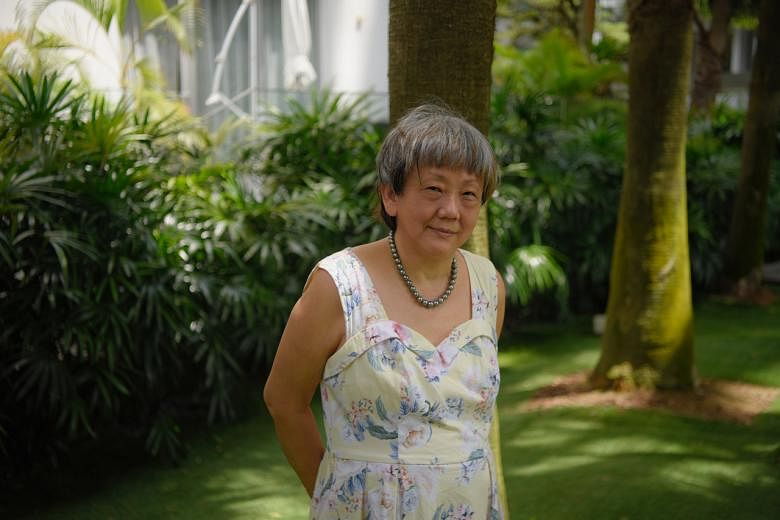Hyflux sought other funding sources for Tuaspring as it had problems getting bank loans: Prosecution
Hyflux founder Olivia Lum arriving at the State Courts on Aug 11.
Aug 11, 2025
SINGAPORE – Hyflux looked to mom-and-pop investors to fund its Tuaspring project because it had trouble getting bank loans, the prosecution said on the first day of the trial involving former senior executives of the failed water treatment plant.
Deputy Chief Prosecutor Christopher Ong noted that a group of banks initially said they were willing to finance the project. But in 2011, they raised concerns after learning of Hyflux’s strategy of selling electricity to subsidise the sale of water to PUB.
Hyflux eventually issued preference shares to fund the integrated water and power project. The company’s collapse left about 34,000 investors of perpetual securities and preference shares, who had sunk in a combined $900 million, with nothing.
In his opening statement to the State Court on Aug 11, Mr Ong said Lum did not disclose information about business risks because she did not want to detract from the positive news of winning a landmark water project, and feared deterring investors.
Hyflux had won a tender for Singapore’s second and largest desalination plant with the lowest submitted bid. It had proposed to sell water to PUB at a first-year tariff price of $0.45/m3, undercutting its competitors by at least 27 per cent.
“At this price, the desalination plant would operate at a loss,” Mr Ong said.
“To make the project financially viable, and also fulfil PUB’s requirement to procure or produce electricity for the desalination plant at Hyflux’s cost, Hyflux intended for the power plant to supply electricity to the desalination plant, while actually selling the vast majority of the power that it generated to the national grid.”
It was only from this sale that Hyflux would be able to make up for the desalination plant’s losses and make the project profitable.
But Hyflux had no prior experience in power generation, much less selling electricity. The Tuaspring project would be the first time Hyflux entered the electricity market, the prosecution said.
In total, seven people have been charged over Hyflux’s intentional failure to disclose information relating to Tuaspring, among other things.
Six of them – Hyflux founder and former chief executive Olivia Lum Ooi Lin, former chief financial officer Cho Wee Peng, and former independent directors Teo Kiang Kok, Christopher Murugasu, Gay Chee Cheong and Lee Joo Hai –
are contesting their charges in a 56-day trial scheduled to run from Aug 11 to Feb 5, 2026.
The prosecution will proceed on 11 charges, including two of the six charges Lum faces. The remaining four charges against Lum are stood down.
It is expected to rely on testimony from former Hyflux employees and bank representatives who were involved in negotiations on financing the Tuaspring integrated water and power project.
How it all unfolded
To finance the Tuaspring project, which was initially projected to cost $890 million, Hyflux sought a term loan of about $527 million from a consortium of banks.
Six banks signed in-principle commitment letters in October 2010 indicating their willingness to finance the project. But they had not been told of Hyflux’s plan to build a power plant and sell excess electricity to the grid at the time, Mr Ong noted.
In November 2010, when they found out about Hyflux’s power strategy, they “raised serious concerns”. In January 2011, they told Hyflux that they could not lend it money on the terms previously indicated, as the power plant introduced new “merchant sale risk and operational risk”.
On 4 July 2011, only three of the original six banks - DBS, Mizuho Corporate Bank and Sumitomo Mitsui Banking Corporation - extended Hyflux financing of $150 million for the construction of the desalination plant. This financing was eventually terminated by Hyflux.
Tuaspring was ultimately financed by a shareholder’s loan of $840.4 million by Hyflux in October 2011, which was in turn refinanced with Maybank Singapore and Maybank Kim Eng Securities in September 2013.
The case against Lum
In January 2011, in the midst of their negotiations with the banks, Hyflux’s management began to contemplate issuing of preference shares to raise funds.
On 19 January 2011, Hyflux senior vice president, legal (business) Ms Yang Ai Chian informed the Board of the need to issue preference shares to “increase our funding options” for “several new major projects” that Hyflux was expected to win that year.
In reality, this money was meant to fund Tuaspring because of the challenges Hyflux faced in getting bank financing.
On 13 April 2011, Hyflux lodged an offer information statement with the Monetary Authority of Singapore to issue up to $200 million in 6% preference shares. These were oversubscribed and the offer amount was increased. Hyflux ultimately raised $400 million.
But the statement did not mention risks arising from Hyflux’s entry into the electricity business, or those associated with Hyflux’s strategy for Tuaspring, which could affect the company’s financial position or results, the prosecution said.
The information was omitted because Lum wanted to downplay Tuaspring’s significant exposure to the electricity market, both in Hyflux’s announcement that it had been named the “preferred bidder” for the desalination project, as well as in the offer information statement, the prosecution said.
“Lum was determined that Hyflux had to win the bid and cement its status as a global leader in the water treatment and desalination industry. Hyflux was facing setbacks in its Middle Eastern ventures and winning the Tuaspring bid was critical for strengthening the company’s order book,” Mr Ong said.
“She did not want to detract from the positive news of winning a landmark water project, by revealing the Tuaspring Project’s reliance on electricity sales, and the fact that the low tariff price – the key to winning the tender – was only viable because of such electricity sales.”
The prosecution also said Lum was well aware of the banks’ negative reactions regarding the power plant component of the project, and feared that full disclosure might deter investors and compromise Hyflux’s ability to raise funds through the planned preference shares.
This, in turn, could jeopardise financial close for the project and potentially result in losing the bid, the prosecution said.
The desalination plant of the Tuaspring Project became operational on September 18, 2013. But its power plant only became operational nearly two years later, on or around August 2015. It began selling electricity commercially on 18 February 2016.
In March 2011, the average Uniform Singapore Energy Price had been around $187 per megawatt hour (MWh). By February 2016, this had fallen to around $49.10 per MWh.
As the profitability of Tuaspring depended on electricity sales, this fall in electricity prices hit Hyflux hard. In its 2017 annual report, it reported a $115.6 million after tax loss.
The report stated that the weak power market in Singapore drove losses for the first time in Hyflux’s history, with the Tuaspring Project accounting for the majority of the losses.
On 21 May 2018, Hyflux suspended trading of its shares. The next day, Hyflux announced that it had applied to seek court protection for debt reorganisation.
On 18 May 2019, PUB took over the Tuaspring desalination plant. On 1 June 2022, a wholly owned subsidiary of Malaysia-based YTL Power International, YTL Powerseraya, completed its acquisition of the Tuaspring power plant.
By 16 November 2020, Hyflux entered judicial management and into liquidation on 21 July 2021.
Other witnesses include a lawyer from Stamford Law Corporation, who was Hyflux’s external legal counsel on the April 2011 offer information statement; an SGX representative who will provide evidence on the sequence of events that led to this case being investigated; and a PUB representative, who will testify to PUB’s dealings with Hyflux and its employees and management during the tender and award process for Tuaspring.
The Prosecution will also adduce evidence from a securities expert, Mr Kevin Gin who will address why the omitted information ought to have been disclosed by Hyflux.
The hearing continues.










